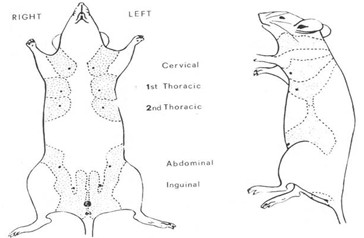Dental disease
Overgrown incisor teeth (particular the lower incisors) are the most common oral problem in mice as their incisors continuously grow. With only the incisors continuously growing in mice, dental disease affecting the cheek teeth is much less common than in some other rodents such as guinea pigs whose molars also grow continuously.
Providing a good quality diet and enrichment items for mice to gnaw on can help to avoid overgrown incisor teeth.
Overgrown incisor teeth are sometimes the result of malocclusion (misalignment of the top and bottom teeth, either present since birth or because of trauma).
Affected mice may be off their food, slobbering and drooling, and have weight loss. There may be swelling on the face, and this might be painful, as evidenced by them rubbing at their face or wiping it against the enclosure.
Speak to your veterinarian about treatment, which requires regular trimming of the teeth, generally every 4-5 weeks. Brief sedation or anaesthesia may be necessary. The affected tooth (or teeth) can be extracted, but this is very difficult to do (the root is much longer than the tooth).
Mammary tumours in mice
Mammary tumours are the most common cancer found in mice. They can occur over a large area as there is mammary tissue over most of the skin of mice – see the diagrams below. The tumours can be very fast growing, doubling in size within two weeks or less.

Unfortunately, mammary tumours in mice are almost always malignant and are reported to often be associated with mouse mammary tumour viruses. Although mammary tumours can be treated by surgical removal, sadly they often recur and the long-term prognosis is poor.
Chronic respiratory disease in mice
Upper or lower respiratory tract diseases are common in mice and mostly caused by Sendai virus and Mycoplasma, a type of bacteria (M. pulmonis).
The disease caused by Sendai virus is usually acute and adults will normally recover within two months, while very young mice may die.
Respiratory disease that extends beyond two months is usually due to Mycoplasma infection (with or without the Sendai virus).
Clinical signs are variable and include:
- Laboured, rapid breathing
- Sniffling and sneezing
- Chattering
- Head tilt
- Reduced grooming
- Weight loss
Mycoplasma can cause pneumonia, suppurative rhinitis (pussy nose infection), and occasionally otitis media (infection of the middle ear).
By the time the problem is noticed, the changes in the lung are permanent and the infection cannot be eliminated. Treatment with antibiotics, bronchodilators, and steam therapy can improve the mouse’s symptoms, but does not eliminate the infection.
Skin problems
Skin problems are common in mice and are generally a result of infections (e.g., parasitic, fungal, bacterial), husbandry related problems, behavioural issues, or may be idiopathic (of unknown cause).
Fur mites are a common cause of infectious skin problems in mice. Affected mice usually have thin and greasy fur especially in areas which they find hard to groom (e.g., head and trunk). If severely affected mice may be extremely itchy and may damage their own skin. For more information on fur mites and other parasites, see this article.
Husbandry related issues resulting in skin problems include elements in the environment of the mice which may damage the skin (e.g., abrasive surfaces, poorly constructed housing that cause the mice to chafe/rub their hair or skin on it), inappropriate conditions like low humidity, and lack of environmental enrichment.
Behavioural skin issues are commonly related to social dominance behaviours which are normal within a nest of mice. Barbering occurs when the dominant mouse nibbles off the whiskers and hair around their eyes and muzzle of the subordinate mice. There is just hair loss, no other skin damage and one mouse (the dominant mouse) retains all their hair. Mice may also barber when they are stressed, and when lactating (nursing young). Mice may fight, especially males who are not littermates who have been together since birth and inflict potentially severe bite wounds on each other. If mice continue to show aggression towards one another and/or injure each other, they should be separated and no longer housed together. Keeping mice together who do not get along is detrimental to their welfare and may be dangerous.
References
Frohlich J (2020) Rats and mice. In: Quesenberry KE, Orcutt CJ, Mans C, Carpenter JW (eds) Ferrets, rabbits and rodents, 4th ed. W.B. Saunders, pp 345–367
